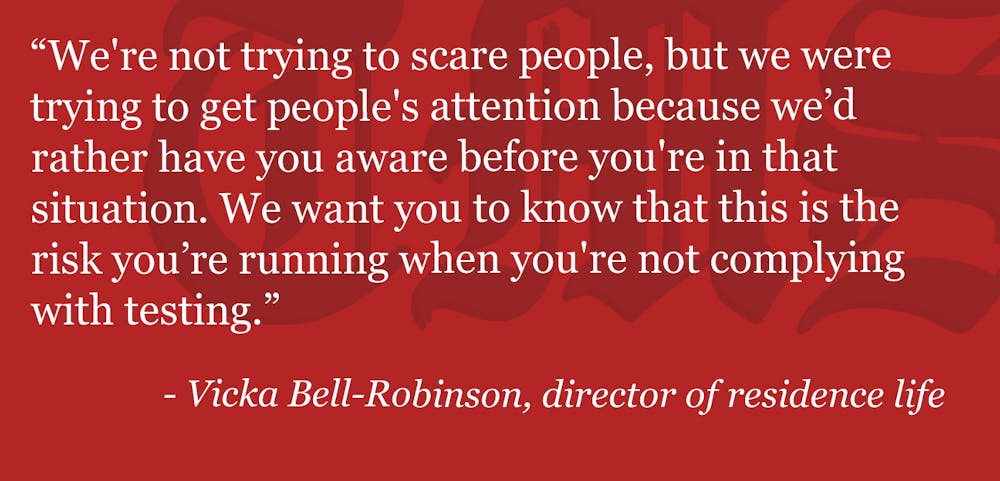Students living on campus at Miami University received an email on March 16 from the Office of Residence Life warning them that they will lose access to their residence hall and meal plan if they fail to comply with the school’s COVID testing policy.
“If you repeatedly (more than once) fail to schedule or take a test when invited, you will lose access to your residence hall room for the remainder of the semester,” the email read. “You will not be able to use your meal plan or attend face-to-face classes.”
Many residential students, whether they had skipped testing invitations or not, were alarmed by the subject heading of the Office of Residential Life’s email, which read “COVID Test: Risk EVICTION if you skip.”
Natalie Upholz, a first-year living in a residence hall, said she found the email stressful.
“It made me more worried about [missing tests],” Upholz said. “I [started to] check my emails more.”
Vicka Bell-Robinson, director of residence life, explained that the subject’s heading was an attempt to get more students to open and read the information in the email.
“We're not trying to scare people, but we were trying to get people's attention because we’d rather have you aware before you're in that situation,” Bell-Robinson said. “We want you to know that this is the risk you’re running when you're not complying with testing.”
Kimberly Moore, Dean of Students, explained that the disciplinary policy abides to the standards stated in the Healthy Together Pledge, which students were required to sign in order to participate in any on-campus activities.
Part of the pledge states that students must “participate in testing as requested by Miami University or the Butler County General Health District,” according to Miami’s website.
“It is critically important for students to participate,” Moore wrote in an email to The Miami Student. “If they don't, the consequences are proportionate as they lose access to in-person classes, the rec center and other community spaces that are vulnerable to transmission of the virus.”
Despite the email’s alarming heading, eviction is just the final step in a lengthy disciplinary process.
For their first and second missed COVID tests, students receive warnings via email reminding them to comply with testing, or they risk punishment.
Enjoy what you're reading?
Signup for our newsletter
“We probably average every week between 50 and 80 students who are in double noncompliance,” Bell-Robinson said.
After missing a third test, students are contacted by the Office of the Dean of Students informing them that they are in danger of losing access to on-campus resources and are required to get an off-campus COVID test and submit their results.
So far, the office has reached out to more than 600 students living both on and off-campus for missing multiple testing invitations.
Spencer Cohen, a sophomore living off-campus, had his ID turned off after missing three invitations.
“I went to CVS to get tested, and I had to send them my confirmed negative test to get back my access to campus,” Cohen said.
Bell-Robinson said the reason for requiring an off-campus test is because the university is limited in the number of tests they can perform each day, so they aren’t able to hold spaces for students who don’t comply.
Off-campus tests can run costs of around $140, which Miami does not cover.
Continued noncompliance at this stage results in the loss of access to various campus services.
Moore described the prevalence of this level of noncompliance.
“We have had a number of students who have come very close (down to hours), but ultimately get compliant before losing their campus access including to their residence halls. A number of off-campus students have indeed lost campus access,” she wrote.
The disciplinary policy put forth by Miami appears to be demonstrating its effectiveness at getting students to schedule tests on time.
“We have seen an increase in compliance,” Moore wrote, “since students have been held accountable for participating in the testing program.”




